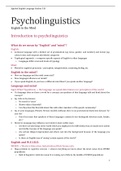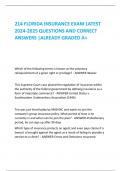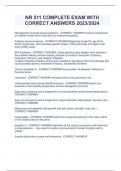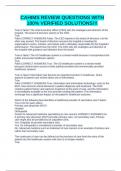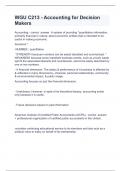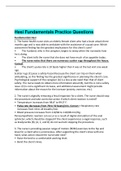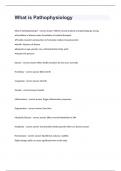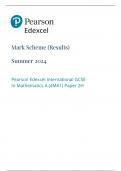Applied English Language Studies 318
Psycholinguistics
English in the Mind
Introduction to psycholinguistics
What do we mean by “English” and “mind”?
English:
• Germanic language with a distinct set of grammatical (eg. tense, gender, and number) and lexical (eg.
colour terms and temporal adverbials) categories
• Typological approach → compares specific aspects of English to other languages
o Languages differ at several levels of typology
Mind:
• Mental or cognitive processes – perception, categorisation, reasoning, feeling, etc.
English in the mind?
• How are language and the mind connected?
• Does language influence our minds?
• If you speak English, do you have a different mind than if you speak another language?
Language and mind
Sapir-Whorf hypothesis → the language we speak determines our perception of the world
• If a language does not have a word for a concept, can speakers of that language talk and think about the
concept?
• Eg. tribe in the Amazon
o No word for ‘snow’
o Shown video of snowfall
o Can they describe this/talk about this with other members of the speech community?
• Eg. in some languages (Finnish, Persian, Swahili, isiXhosa) there is not grammatical distinction between ‘he’
and ‘she’
o Does this mean that speakers of these languages cannot/do not distinguish between male, female,
etc.?
• However, language may influence our minds in more subtle ways
o Are there certain things in the world which you might perceive differently; that are made more salient
and visible, because of the language you speak?
o Are certain things foregrounded and others cast into the background because of the language you
speak?
o Is there an English way of ‘seeing’ certain aspects of the world?
English and W.E.I.R.D.
WEIRD → Western Education Industrialised Rich Democratic
• Huge problem in cognitive sciences → almost everything we know about the mind comes from WEIRD
populations
o Bulk of linguistic relativity research is coming out of labs in the middle of WEIRD populations
1
,Applied English Language Studies 318
• WEIRD only accounts for 10% of the world’s population
o Problematic for generalisability → focuses on specific language and culture groups
• Assumptions about language and the mind are often WEIRD
• One way to counter WEIRD bias → study how the English language influences our minds
Experiential Relativity
Statement 1:
Languages across the world partition reality in semantically different ways
• Linguistic diversity – crosslinguistic variation in grammatical and lexical categories
o Eg. English tenses vs. Kalaw Lagaw Ya
▪ English → past; present; future
▪ Kalaw Lagaw Ya → remote future; today/near future; present; today past; recent past; remote
past; last night
Statement 2:
Semantic structure influences thought
• The way we talk about certain phenomena may influence the way we think about them
o Labels → the satisfactory cup of tea vs. the exceptional cup of tea
o Modality → you can eat some cake vs. you should eat some cake vs. you must eat some cake
o Metaphors → clinic is a sanctuary vs. clinic is a prison
Experiential relativity
Linguistic relativity | Cultural relativity | Bodily relativity
• Theory that the mind is influenced by linguistic, cultural, and bodily experiences
• As a result, individuals who speak different languages, come from different cultures, or have different
types of bodies will perceive and think differently
Linguistic relativity
Slobin – thinking for speaking
• Version of linguistic relativity
• Language should affect cognition during the process of encoding our thoughts into words → “thinking for
speaking”
• Different types of information may be activated in memory, based on an individual’s language
• Eg. motion events
o English speakers specify manner → specify path with prepositions
o Spanish speakers specify path of motion, as well as destination → often omit manner
Testing language using language
• Eg. testing colour recognition using colour terms
• Using language to assess language as a phenomenon is highly circular
o If we can be affected by language during language assessment, the language used in the assessment
could potentially influence the results → the language produced as a result of assessment
• How do we move beyond this?
o Psychophysics – the study of how precisely organisms can encode, discriminate, or reproduce simply
physical stimuli
2
, Applied English Language Studies 318
▪ Cross-linguistic comparisons backed up by psychological experiments
Language and time
• Do you think of the future as in front of you or behind you?
o How do you think of the past?
• Generally, for English speakers → future is in front and past is behind
o English speakers subconsciously sway forward when talking about the future, and backwards when
talking about the past
• Aymara speakers → future is behind, and past is in front
Language and space
• English speakers → orientate selves in terms of left, right, in front of, and behind
• Pompuraaw → Aboriginal community in Northern Australia
o Orientate selves in terms of cardinal directions
• Do these arrangements actually influence cognition?
o Picture arrangement task → English speakers arrange from left to right; Pompuraaw speakers
arrange from East to West
Language, numbers, and quantities
• Piraha speakers → fewer resources for describing numbers than other languages (eg. English)
o About one → about two → many
Temporal Cognition
• Experiential relativity – the proposal that the language we speak (linguistic relativity), the culture we
are embedded in (cultural relativity), and the body we exist within (bodily relativity) have an influence on
the way we perceive the world around us
How do we study English in the mind?
Offline methods
• Indirect access to mental processes
o Tells us more about behaviour
o Eg. elicitation: production and comprehension
• Data collection is less controlled
• Larger sample groups
• Language production
o Verbal and non-verbal
Online methods
• Direct access to mental processes
• Eg. EEG, MRI, fMRI, eye-tracking, etc.
• Limited sample size
o One person per session
o High cost per session
• Better conditions for testing processes
3
Psycholinguistics
English in the Mind
Introduction to psycholinguistics
What do we mean by “English” and “mind”?
English:
• Germanic language with a distinct set of grammatical (eg. tense, gender, and number) and lexical (eg.
colour terms and temporal adverbials) categories
• Typological approach → compares specific aspects of English to other languages
o Languages differ at several levels of typology
Mind:
• Mental or cognitive processes – perception, categorisation, reasoning, feeling, etc.
English in the mind?
• How are language and the mind connected?
• Does language influence our minds?
• If you speak English, do you have a different mind than if you speak another language?
Language and mind
Sapir-Whorf hypothesis → the language we speak determines our perception of the world
• If a language does not have a word for a concept, can speakers of that language talk and think about the
concept?
• Eg. tribe in the Amazon
o No word for ‘snow’
o Shown video of snowfall
o Can they describe this/talk about this with other members of the speech community?
• Eg. in some languages (Finnish, Persian, Swahili, isiXhosa) there is not grammatical distinction between ‘he’
and ‘she’
o Does this mean that speakers of these languages cannot/do not distinguish between male, female,
etc.?
• However, language may influence our minds in more subtle ways
o Are there certain things in the world which you might perceive differently; that are made more salient
and visible, because of the language you speak?
o Are certain things foregrounded and others cast into the background because of the language you
speak?
o Is there an English way of ‘seeing’ certain aspects of the world?
English and W.E.I.R.D.
WEIRD → Western Education Industrialised Rich Democratic
• Huge problem in cognitive sciences → almost everything we know about the mind comes from WEIRD
populations
o Bulk of linguistic relativity research is coming out of labs in the middle of WEIRD populations
1
,Applied English Language Studies 318
• WEIRD only accounts for 10% of the world’s population
o Problematic for generalisability → focuses on specific language and culture groups
• Assumptions about language and the mind are often WEIRD
• One way to counter WEIRD bias → study how the English language influences our minds
Experiential Relativity
Statement 1:
Languages across the world partition reality in semantically different ways
• Linguistic diversity – crosslinguistic variation in grammatical and lexical categories
o Eg. English tenses vs. Kalaw Lagaw Ya
▪ English → past; present; future
▪ Kalaw Lagaw Ya → remote future; today/near future; present; today past; recent past; remote
past; last night
Statement 2:
Semantic structure influences thought
• The way we talk about certain phenomena may influence the way we think about them
o Labels → the satisfactory cup of tea vs. the exceptional cup of tea
o Modality → you can eat some cake vs. you should eat some cake vs. you must eat some cake
o Metaphors → clinic is a sanctuary vs. clinic is a prison
Experiential relativity
Linguistic relativity | Cultural relativity | Bodily relativity
• Theory that the mind is influenced by linguistic, cultural, and bodily experiences
• As a result, individuals who speak different languages, come from different cultures, or have different
types of bodies will perceive and think differently
Linguistic relativity
Slobin – thinking for speaking
• Version of linguistic relativity
• Language should affect cognition during the process of encoding our thoughts into words → “thinking for
speaking”
• Different types of information may be activated in memory, based on an individual’s language
• Eg. motion events
o English speakers specify manner → specify path with prepositions
o Spanish speakers specify path of motion, as well as destination → often omit manner
Testing language using language
• Eg. testing colour recognition using colour terms
• Using language to assess language as a phenomenon is highly circular
o If we can be affected by language during language assessment, the language used in the assessment
could potentially influence the results → the language produced as a result of assessment
• How do we move beyond this?
o Psychophysics – the study of how precisely organisms can encode, discriminate, or reproduce simply
physical stimuli
2
, Applied English Language Studies 318
▪ Cross-linguistic comparisons backed up by psychological experiments
Language and time
• Do you think of the future as in front of you or behind you?
o How do you think of the past?
• Generally, for English speakers → future is in front and past is behind
o English speakers subconsciously sway forward when talking about the future, and backwards when
talking about the past
• Aymara speakers → future is behind, and past is in front
Language and space
• English speakers → orientate selves in terms of left, right, in front of, and behind
• Pompuraaw → Aboriginal community in Northern Australia
o Orientate selves in terms of cardinal directions
• Do these arrangements actually influence cognition?
o Picture arrangement task → English speakers arrange from left to right; Pompuraaw speakers
arrange from East to West
Language, numbers, and quantities
• Piraha speakers → fewer resources for describing numbers than other languages (eg. English)
o About one → about two → many
Temporal Cognition
• Experiential relativity – the proposal that the language we speak (linguistic relativity), the culture we
are embedded in (cultural relativity), and the body we exist within (bodily relativity) have an influence on
the way we perceive the world around us
How do we study English in the mind?
Offline methods
• Indirect access to mental processes
o Tells us more about behaviour
o Eg. elicitation: production and comprehension
• Data collection is less controlled
• Larger sample groups
• Language production
o Verbal and non-verbal
Online methods
• Direct access to mental processes
• Eg. EEG, MRI, fMRI, eye-tracking, etc.
• Limited sample size
o One person per session
o High cost per session
• Better conditions for testing processes
3

